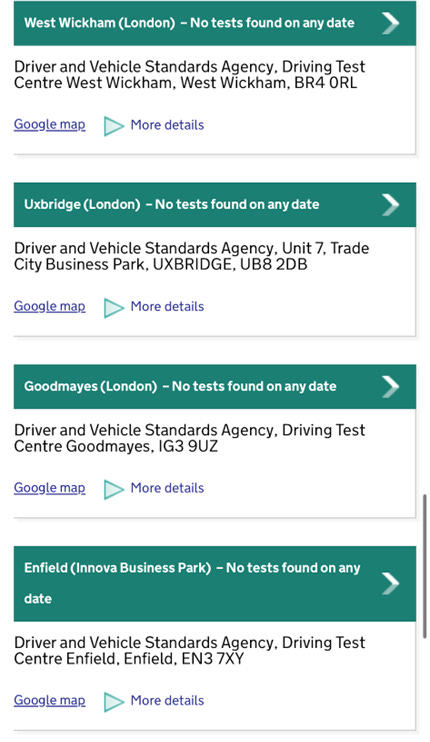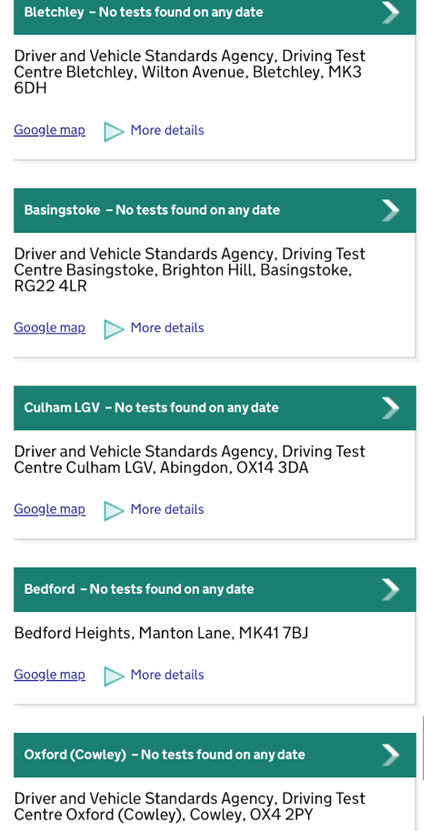End The Backlog is the campaign to end the crisis in driving test bookings in the UK.
If you’re part of the lucky majority of adults who learned to drive before Covid, you might not be aware that for over four years now it’s been almost impossible to book a driving test.
I don’t just mean that there are long waiting lists…. I mean it’s impossible. Here is a selection of screenshots from the last time I checked the website. Apologies that this is long, but scrolling down will give you an idea of how bad the situation is:
As you can see, there were “no tests available” essentially anywhere in the South East. No matter how long I was prepared to wait before sitting the test, or even if I was willing to travel from where I live in London to the Isle of Wight. I think it is fair to say on the basis of this that it is functionally impossible to book a driving test for people in most parts of the country right now, and that the system is completely, completely broken.
How did this happen?
Cast your mind back to 2020, when Covid lockdowns meant everything suddenly shut, including the government’s driving test system. Those of us (like me) who already had tests booked had them automatically postponed by a couple of months – often repeatedly, when further lockdowns and quarantines meant we couldn’t attend the new dates, either. What this means is that when lockdowns eased, there were lots of advance bookings in place from those who’d by then been waiting months and months to sit their tests – but many others at the same time had also joined the back of the queue. While the testing system was closed, they’d also become ready to book a test, and now they were rapidly filling up the few slots that were remaining.
The result? Total logjam. Test appointments can be booked up to 24 weeks in advance – about half a year – but these very quickly filled up. And that’s where we are today. Demand and availability have fluctuated a little over the last four years, but there’s been no meaningful shift of the “backlog” that was generated during Covid lockdowns. Go onto the booking site, and you’ll likely be told, as I was, there are “no tests found on any date”. There’s no further waiting list you can join if there aren’t any tests available within 24 weeks – you simply can’t book.
My estimate – which is corroborated by researchers from The Economist, The Guardian, and others – is that the backlog currently stands at about one million tests, not far off where it was four years ago. This means that a million additional tests would have to be provided in order for normal service to resume.
Obviously, the impossibility of getting a driving license has a real impact on people’s lives. Many people are so desperate that they’ll take time off work and travel across the country to whichever remote area they’ve managed to secure a booking – official data from last year shows that the longest such distance was over 600 miles, from Exeter to the Shetland Islands. Others pay above the odds through dodgy third party booking sites (many of which use automated software to immediately snap up any available slots and re-sell them), and sometimes report being scammed as a result.
As part of this campaign I’ve spoken to many who feel utterly despondent over their inability to get a driving licence; often it is needed for jobs, and not being able to get a test can really make it feel as though you’re being impeded from growing up and living an independent life. One young person told me: “My entire life is in limbo right now”. Another said: “You are now not just being tested on your driving skills, but also if you can financially, mentally and emotionally keep going.”
End The Backlog exists because we believe this problem should be easy to solve – but the government is not solving it. In four years, the DVSA (the government body in charge of administering driving tests) has yet to acknowledge the scale of the problem. When asked about it, they imply that the problem is caused by things like late cancellations and no-shows, when really these are tiny numbers compared to the million-strong backlog that built up during Covid. Until a million additional tests are carried out, there is no reason to think the problem will go away – and so far, there does not seem to be any mention of a plan to do this.
The good news though is that Labour’s new Transport Secretary, Louise Haigh, appears to be interested in fixing the problem. She has said that the current situation is “unacceptable” and that tackling it is a “key priority”. There’s not been any indication yet, however, of what she plans to do about it. That means now is the time to make lots of noise and keep the pressure on to get effective solutions put in place.
These are our proposals:
Step one: the DVSA and the Department for Transport must acknowledge the scale of the problem. They can then immediately implement some easy fixes: cracking down on “bots” booking up slots, and extending the validity of theory test passes for those affected by the backlog. (Currently you have to pass a practical test within two years of passing a theory test – but because of the difficulty of getting tests at all, many are finding that their theory test expires, putting them back to square one).
Step two: introduce surge capacity to clear the backlog. The system as it stands is not capable of providing the million additional tests needed to clear the backlog. If nothing changes, the problem might never go away. We propose allowing approved driving instructors (ADIs) to carry out tests on a freelance basis to provide additional capacity. This has the potential to clear the entire backlog within months.
Step three: fix the system for good. The driving test system is creaking at the seams. It’s far from the efficient and flexible service that taxpayers deserve. We propose improvements such as introducing a “fast track” service, where it is possible to pay a premium price to have a guaranteed test the same week. This would mean that those who need tests urgently are able to get them, while at the same time generating extra revenue that could be invested into providing better services for everyone.
For more detail on these solutions, see our website.
This newsletter exists to share updates on the campaign. Already, we’ve received over 33,000 signatures on our petition; had coverage in The Telegraph, The Times, and The Economist; and had parliamentary questions submitted on the topic. Follow to hear more as it happens – you can also follow us on Twitter to receive updates on there. You can also find much more info, including a full list of media coverage and stories of people affected by the backlog, on our website.












